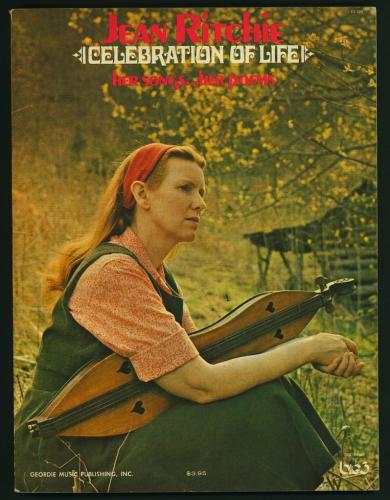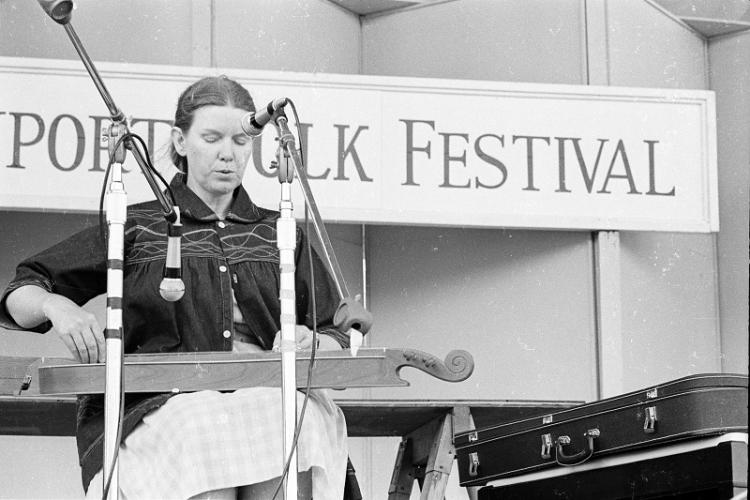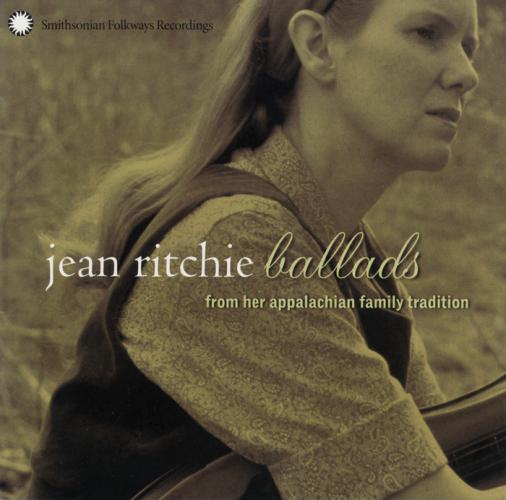
Jean Ritchie Celebration of Life: Her Songs. . . Her Poems, Book cover with photograph by George Pickow, Geordie Music Company, Inc., New York, 1971. National Museum of American History. Gift of Nancy B. Hoffman and Elliot L. Hoffman.
By Diana Turnbow, administrative assistant for the Smithsonian American Women’s History Initiative
Singing was as common as breathing in the Kentucky mountain community in which Jean Ritchie was born on December 8, 1922.
“We sang sort of to accompany the things that we did, accompany our lives, I guess,” Ritchie said in the documentary film on her life, Mountain Born: The Jean Ritchie Story. “There was no teachers of singing. People just sang as a natural thing. The way they heard it from their mothers and fathers and grandfathers and grandmothers.”
After graduating from college with a degree in social work, Ritchie brought the songs her family had sung for generations to New York City when she moved there in 1946.
At first, Ritchie sang with the school children at Henry Street Settlement, a social service agency in Manhattan where she worked. She also sang at social gatherings and her reputation as a folk singer grew by word of mouth. She became friends with prominent folk musicians Woody Guthrie and Pete Seeger and was a regular guest on singer Oscar Brand’s Folksong Festival radio show. In 1951, folklorist Alan Lomax recorded her extensive collection of songs for the Library of Congress. Ritchie was on her way to becoming known as “The Mother of Folk” for her contributions to American music.

Jean Ritchie performs at the 1967 Newport Folk Festival. Photo by Diana Jo Davies. Courtesy of the Ralph Rinzler Folklife Archives and Collections.
Ritchie often played the mountain dulcimer while she sang. She had learned to play the traditional instrument from her father and uncle. Through her popular songs, Ritchie introduced the dulcimer’s sound to new audiences and revived interest in the instrument.

Appalachian Dulcimer, used by Jean Ritchie. National Museum of American History. Gift of Peter Pickow.
Ritchie learned more about the history of her family’s music. With the assistance of a Fulbright fellowship in 1952, she spent 18 months in the British Isles tracing songs to their origins in England, Scotland, and Ireland.
Ritchie also composed her own songs about the difficulties of mountain living. Her song “Black Waters” criticizes mining companies and mourns how their strip-mining practices destroyed the Kentucky mountains and polluted the water. “The L&N Don’t Stop Here Anymore” references the Louisville and Nashville Railroad. Ritchie’s lyrics discuss how station closings caused unemployment and hurt local economies. Johnny Cash recorded a cover of the song. Ritchie’s music influenced a generation of rising singers including Joni Mitchell, Bob Dylan, Dolly Parton, EmmyLou Harris, and Joan Baez.
Ritchie’s dulcimer case is in the collection of the Smithsonian’s National Museum of American History. The stickers on her case record the events she attended and ideas she supported as a folk musician.

Dulcimer Case, used by Jean Ritchie. National Museum of American History. Gift of Peter Pickow.
Ritchie died on June 1, 2015, in her home state of Kentucky. By the end of her life, Ritchie had recorded more than 30 albums and authored seven books about folk music and her family. In addition to her Fulbright fellowship, Ritchie received the National Endowment for the Arts’ Bess Lomax Hawes National Heritage Fellowship and the Folk Alliance Lifetime Achievement Award.

Album cover of Jean Ritchie: Ballads from her Appalachian Family Tradition, 2003. Smithsonian Folkways.
Related Posts
Diana Turnbow provides administrative support and works on special projects for the American Women’s History Initiative. She is invested in finding and sharing the stories of American women artists and makers.